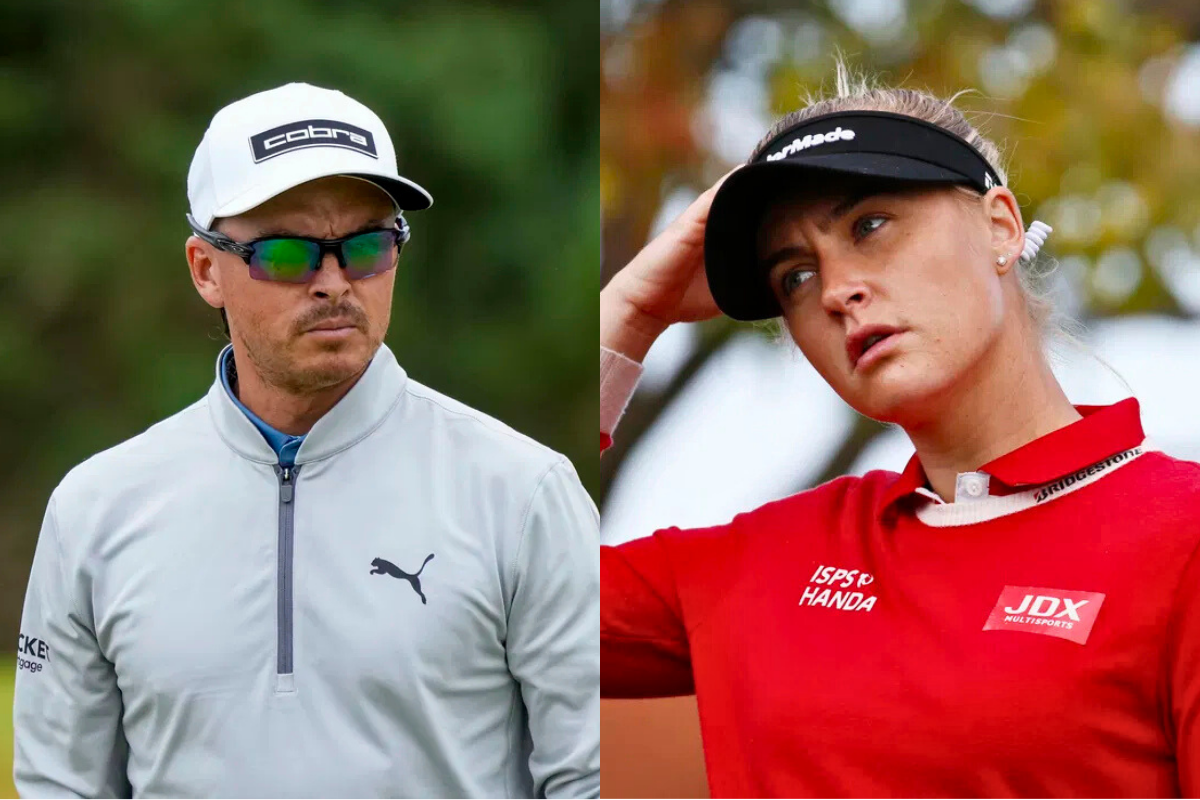
Imago
Charley Hull, Rickie Fowler Credit: Imago

Imago
Charley Hull, Rickie Fowler Credit: Imago
“If you don’t feel 100 percent right mentally, that’s an injury too,” is what Rory McIlroy said recently. Yet for many PGA Tour golfers, who regularly take breaks to recover from physical setbacks, mental health still tends to take a backseat. Even with the Tour’s recent push to improve well-being resources, players often shy away from confronting their struggles, which is in stark contrast with the woman players of golf. That difference and reluctance of male players came into focus in a recent conversation with sports psychologist Dr. Julie Amato.
Watch What’s Trending Now!
Amato, speaking on The Mixed Bag podcast, shared how she has connected with nearly 90 LPGA players so far. That is like 20 to 25 each year. She pretty much knows all of them, dining with them and their husbands frequently. “These players are absolutely incredible, personality-wise, and they’re so grateful, you know, they’re grateful for the fans, they’re grateful for this life that they have.”
To Amato, the openness of the LPGA players is very striking. If they have not been playing well, they will immediately reach out. “I could use someone to talk to,” is what they will tell her. That willingness to ask for help often prevents them from spiralling. Moreover, it reflects a culture on the LPGA that the players are more communal and grateful. It is partly shaped by the fact that these women often operate with fewer financial resources than their male counterparts.
In November, @MaxHoma23 started seeing a sports psychologist to work on his mental game.
It’s been a key factor in his success both on and off the course. pic.twitter.com/mNxXxRLiyf
— PGA TOUR (@PGATOUR) August 30, 2023
Korn Fairy Tour players, Amato noted, carry a similar eagerness. “Korn Fairy guys…they will do anything, you know, that you tell them to do to try to get to that next level.” These players are hungry to break through to the PGA Tour and, hence, will do anything to get that edge. Being so close to their dream makes them receptive to any support that might help. At the same time, their resource constraints echo what Amato sees on the LPGA side. But once players reach the PGA Tour, everything changes.
“You’re training and striving your whole life to get to this thing[PGA Tour]. And then once you do, it’s incredibly challenging…You’re really, you know, a lot of ways by yourself.” These players, who enjoyed a sense of camaraderie on the Korn Fairy Tour, are now isolated from each other. The whole system becomes business-like. “And so I think the main difference that I see with the PGA players and the LPGA players, and again, this is a little bit of a male problem…but guys don’t ask for help as readily or easily.”
That reluctance is not unique to her practice. Former PGA Tour pro Steve Wheatcroft addressed the same issue in a powerful essay published on the Tour’s website. He opened up about his struggles with alcoholism and depression. He narrated how, from the beginning, golfers are taught to be mentally strong and to simply “suck it up.” Wheatcroft admitted that this ingrained culture left him uncomfortable with calling the Tour’s mental health services. “When you have swing problems, you go to your coach, right. If you’re having putting problems, there’s someone to see. Your shoulder hurts, there’s a physical therapist. Why does seeking help for mental health carry a different stigma than that?” he said. Rickie Fowler, too, has opened up about how his inconsistent form in recent seasons has taken a toll on him mentally. “It’s definitely been very tough mentally just trying to keep pushing forward.”
On the other hand, some women golfers have been taking the reins into their hands to destigmatize mental health. Lexi Thompson is one such example. Once the pressure of the sport got too much for her, she decided to withdraw from full-time golf, and now only participates in a select few tournaments. Lydia Ko is another such example. The Hall of Famer has spoken about battling mental struggles and climbing out of a slump. She took the help of a mental coach to help clear the “demons” in her head. Then there is Charley Hull who was diagnosed with ADHD a few years back and since then has spoken about her struggles.
The PGA Tour itself has recognized the weight of the issue. Commissioner Jay Monahan has acknowledged the pressure players face and emphasized the need to enhance available resources. But resources alone can’t change culture. If reaching out is still coded as weakness, too many golfers will keep bottling it up until they can’t anymore. That’s the difference Amato sees most clearly between the tours: LPGA players treat psychological support as another tool, while PGA Tour players often delay until the struggle is undeniable. “Oftentimes, if I’m seeing a PGA player, the house is burning down and on fire and has been for a couple of years.”
For Amato, the lesson is simple but urgent. Breaking down the stigma, she argues, is the real work ahead.
Certain PGA players are pushing against the stigma
The culture around men’s golf of not showing weakness and not admitting struggle has recently begun to crack. Players like Bubba Watson have spoken candidly about living with ADHD and anxiety, and how years of bottling up his feelings hurt both his life and his game. Wyndham Clark, meanwhile, has shown that seeking help can be a strength, not a flaw. His work with performance coach Julie Elion during his breakthrough 2023 season inspired many.
Rory McIlroy is another name who has become a prominent advocate for treating mental health seriously. He has often talked about his struggles with performance anxiety and has shared strategies like visualization and reframing of negative thoughts as a coping mechanism. Luke Butler has also stepped forward, speaking about using golf as a tool for connection and conversation.
Together, these men challenge the “suck it up” mentality that has long defined the men’s game. They prove that being honest and using the community and professional support are not signs of weakness but are essential for thriving in their career.








